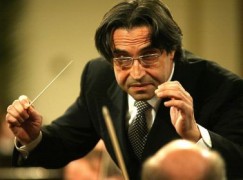Because he’s worth it: What your music director is being paid
mainYesterday, we brought you Drew McManus’s annual earnings list of chief executive pay in US orchestras.
Today it’s the turn of the maestro.
Drew points out that in the year reported, 2001/12, several orchestras (notably Boston and Detroit) deliberately withheld the pay of their music director from the IRS form. Others paid their music director as a private contractor in two or more payments to maintain maestro secrecy. If this trend grows, donors will soon start asking questions.
The top payers were:
1 Chicago Symphony, over $2 million

2 San Francisco SO, also over $2m

3 National Symphony (just under $2m)

The rest can be studied here.
James Levine’s pay at the Met still outstrips the rest.





It is no wonder that so many symphony orchestras are struggling and I will never help another one of them again. This is all truly disgusting. Big payouts are fine with me, provided that they are kept within a profit center, within a true business that takes risks and grows shareholder value. There, paying the CEO millions is fine by me. A symphony orchestra is not, I repeat not a profit center. Quite the contrary! As we all know, they depend on the generosity of the community, of people, both of modest means and extremely wealthy to contribute to their operating costs, contributions which often represent more than 50% of the total operating budget of a symphony orchestra. To beg, cup in hand, year after year, then pay out salaries to music directors and orchestra CEOs equal to or greater than a CEO in a profit oriented, high risk business environment is unconscionable. A symphony orchestra, especially in today’s environment, should be perceived like a charity. The fact that these charities concentrate the donations on first lining the pockets of their music director and CEOs by saying that is what is needed to get quality, I say that is a lie. The classical music world is small and there aren’t hundreds, let alone thousands of employment opportunities for these individuals, so paying them bankers salaries only underlines why my 22 year old son refers to the world of classical music as “putrid” and “decadent”. I totally agree and would advise all others reading this to think many times before you open you wallets to this bunch when they next come knocking with their perennial “Save Our Orchestra” fund raising campaign for which, if you give more than $1,000, you may just get an orchestra coffee mug with Beethoven’s face on it!
It is truly rotten, putrid and decadent and it hopefully won’t go on for many more years like this.
Also, when looking at the three music directors that earn the most, I ask myself why? Eschenbach? The National Symphony Orchestra? Here, Christoph Eschenbach, a has been, washed up conductor got rescued by the NSO after being thrown overboard by too many orchestras to mention and what does he get? He gets the third highest pay package in the business. If corporations were run like this it would certainly resemble the incompetence and political machinations of the former Soviet Union and we all know what happened to that system in the end. Let’s hope that this mess goes the same way, but until then I will never contribute a dime to these orchestras. NSO donators and patrons should be appalled that they have been hoodwinked liked this. Why do you let it go on?
In one of your earlier blog posts you announced that Eschenbach received the Rheingau Music Prize for 2014 and walked away with a cheque for 10,000 euros. Congratulations to the prizewinner!
To think that a man who earns well over 2 million dollars per year actually puts his hand out and accepts a cash prize of 10,000 euros and would keep it for himself is sickening beyond all words. Especially true when arts institutions are living hand to mouth and 90% of most talented musicians are struggling just to get by, just to eat. I also fault the Rheingau Music Festival for coming up with such an ill conceived idea in the first place. That Eschenbach openly and publicly takes the money reflects badly on his character, or lack of, and is yet another reason to avoid this guy at all costs.
Bankers get up to four times as much, are easily replaceable and do not have the unique talents of someone like Riccardo Muti. What is more, bankers are paid with customers’ money whether they like it or not. Anyone who thinks Muti is overpaid is not obliger to pay for tickets to his concerts.
As the wife of a banker, I beg to differ with you. Bankers are not all paid four times as much, they are not so easily replaceable as you make it sound and it is arrogant to say that a banker doesn’t have the same “unique talents as Ricardo Muti”. By whose standards, by whose set of measurements? Just because you love music, as do I, doesn’t mean that the uniqueness of a musician’s talents are any greater or more unique than the special abilities that other professions have. Here, again, is the classic case of “snobbism” in the classical music world, of a sense of elitism and entitlement, simply because it is something that “I like” and that “I can relate to”. When that attitude changes, there may be some hope for the so-called classical music business. Until then, it remains the preserve of an ever dwindling group of individuals, courtiers to their supposed royalty. Do I sense 18th century déjà-vu coming on?
“Anything I don’t understand is easy to do.” – Dilbert’s pointy-haired boss
There are hundreds of bankers; there is only one Riccardo Muti.
The decline in numbers of listeners to classical music has nothing to do with elitism or snobbery. On the contrary, the decline is fed by inverted snobbery whereby people consider lovers of classical music to be “anoraks”. This attitude is fed by profit-centered relativising media and the crushing of individual sensitivity by the dumbing-down, mighty pop industry.
Some would say, “Thank God!”
Some certainly would, but the important thing is – the mathematical equation cited by Stephen is a true fact and it is undisputed.
The last sentence says it all.
Can someone explain how the Pittsburg Symphony manages to have Manfred Honeck with only $570,000? This is less than 1/3 the top salaries. Are there hidden costs? Or are they doing something right?
If ever the saying, “a picture is worth a thousand words” was more apt than here. When I look at the photo of Eschenbach, it tells me everything that I don’t want to know and that would be better left to my nightmares!
Detroit is too embarrassed to fess up to Slatkin’s pay and bennies. It must be a heck of a lot for a city that’s been dying slowly on the vine for the last 30 years. . .
Because SHE’s worth it: Alsop at Baltimore just under 900K (or, in gender terms, one woman is worth half an Eschy).
Honeck’s salary is a steal, based on what his colleagues are getting. Perhaps the pockets of donors in Pittsburgh are not as deep as those in other cities.
What makes you so sure Christoph Eschenbach keeps the Rheingau Award money for himself at the end? Don´t tell me he dared not to inform Slipped Disc immediately about his intentions. And do you really pretend to know in detail which artists donate which part of their fees and / or awards to charities or young artists – silently and without making a huge press statement…? Has anyone ever asked how much Sinfini gets from the major labels – money that comes from the record sales from some of the most criticized artists here? That is real hypocrisy.
I would think that if Eschenbach had the sense to give his small sum of money to a good and worthy cause, then the Rheingau Festival would have announced that at the time. That is the way it is usually done. The fact that nothing of the kind was mentioned in the official press release and subsequent news items, it would logically lead one to conclude that he keeps it all for himself.
Artists and public figures need to be aware of these things and prepare things in advance, in order to avoid these sorts of embarrassing situations. I would think that Eschenbach would be extra careful, considering all of the bad press that he gets here and in many other places. Anybody with an image problem like that needs to work hard to fix it, or at least have professionals in their agency who know better. Since nothing was said at the time of the announcement, then one must conclude that all of the money, as it says, went right to him.
Whilst I agree with you that most politicians function that way, i.e. they act or rather react according to published opinion(s) and comments on them, I am frankly quite relieved that most musicians do not bother too much about the sometimes rather absurd assumptions and accusations and concentrate on their music-making and what they believe in personally and artistically. This might, and in fact often does, include their personal support for charities, colleagues, and young artists, but Slippedisc and some of its followers obviously cannot imagine this, because no news is bad news, and there always has to be something evil. Now, here is the unimaginable, the really bad news for all of them: some artists might neither know nor follow Slippedisc and its comments (including this one, of course)…
Corporations pay disproportionately higher wages to their C-Level executives than they do to the rank and file, so your point is a bit confusing. In the of James Levine, while I abhor the recent news of his pedophilia, he worth to the Met is justified. He conducted more performances, held more rehearsals, oversaw hours and hours of working at the Met than any other performer in the history of the institution. He should be removed from the Met and stripped of all of his honorariums for the abuses he committed, but he was worth every penny the company paid him in terms of the work he performed for the Met through more than four decades.